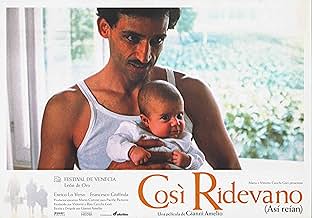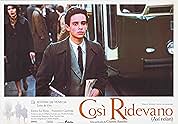Agrega una trama en tu idiomaTurin at the end of the fifties: two brothers have emigrated there from Sicily and the older works very hard to let the younger study and free himself from poverty through culture. The boy h... Leer todoTurin at the end of the fifties: two brothers have emigrated there from Sicily and the older works very hard to let the younger study and free himself from poverty through culture. The boy however is not keen on school and would like to begin to work. When after some time he gets... Leer todoTurin at the end of the fifties: two brothers have emigrated there from Sicily and the older works very hard to let the younger study and free himself from poverty through culture. The boy however is not keen on school and would like to begin to work. When after some time he gets his degree however things take a violent and dramatic turn......
- Dirección
- Guionistas
- Elenco
- Premios
- 9 premios ganados y 14 nominaciones en total
- Dirección
- Guionistas
- Todo el elenco y el equipo
- Producción, taquilla y más en IMDbPro
Opiniones destacadas
The film is separated into six parts labeled "Arrivals," "Deceptions," "Money," "Letters," "Blood" and "Families", each taking place on one day during the period from 1958 to 1964. While this technique allows us to understand the events taking place in Italy during this period, the sudden changes in the lives of the characters is difficult to follow and we are left having to put the pieces of the puzzle together on our own. As the film opens, Giovanni (Enrico Lo Verso), a poor illiterate worker arrives from Sicily to visit his teenage brother Pietro (Francesco Giuffrida) in the industrial north of Italy who is studying to become a teacher. Determined that his brother Pietro will get a good education, he decides to remain in Turin to support him.
It is clear from the outset that all is not well with Pietro. He hides behind a pillar at the train station rather than meeting his brother, then goes out of way to help a Sicilan family who are lost until he finally gives up in disgust. He is very handsome but there is a haunted look in his eyes and it is never clear what his secrets are. Giovanni, magnificently portrayed by Lo Verso, is quite different. He is a giving person -- open and warm hearted. He sacrifices for Pietro, working low paying menial jobs but the younger brother seems unmotivated and does not take studying very seriously. Their love is not at issue, but each has an idealized picture of the other and they never fully come to grips with each other's reality.
As the years go by, Giovanni begins to move up the economic ladder and becomes a low-level Supervisor, then the boss of a cooperative. Pietro meanwhile has gone to a private teacher and has received his degree. The brothers remain close but when Pietro witnesses Giovanni getting into a fight with a presumed underworld figure, the consequences that result from self-sacrifice and the betrayal of morality are explored in a powerful conclusion. Like Giovanni's rise to a position of power through suggested shady dealings, The Way We Laughed seems to be saying that as modern Western societies have become rich, they have arrogantly forgotten the values it took them to get there.
The non-linear structure...set on six separate days, from 1958 to 1964...is completely in keeping with the curvilinear unfolding of the events and emotional reactions throughout this splendid film.
It's powerful ending achieves the exact right tone. I only wish that awful music that accompanies the closing credits didn't nearly jar my sensibilities out of the rich rewards of the movie.
Captioned the chapters by years and key words, the film infallibly circles around the two brothers, about their incompatible interrelation, which can be approximately summed up as follows, Giovanni unyieldingly insists that Pietro should finish his study and become a teacher, to fulfil a dream he is unable to pursue, as if this means the whole world to him, while Pietro, under such pressure to excel in the class, has to live in the fear that he might fail to live up to his dear brother's expectation, which establishes a deep discord between them. Life rarely goes according to one's wishful blueprint, however Amelio's meticulous endeavour, sometimes perilously close to mushy and over-indulgent, is to testify that blood is thicker than water, no matter what, even you have to murder a person, there is a silver lining awaits you.
Attentively restoring a retro setting of a period ripe with absolute poverty and blatant opportunism, Amelio opts for an alternative to green-light the success of the uneducated- but-determined money-grabber other than the younger-but-intellectual generation, eventually it is the latter's voluntary sacrifice saves the former from going down to the prison, so that the former can secure his hectoring business and start a genuine Italian family, with a sincere guilt compelling him to make up for the latter, but in the coda, after a heavy-handed device to sabotage a formal farewell ceremony, it leaves us wonder, how the two brothers have changed internally during the time-span, the same four-elephants-in-a- fiat joke caps the film, yet, they have become more distant from each other both physically and mentally.
Enrico Lo Verso, the leading actor of Amelio's more well-received works (THE STOLEN CHILDREN 1992 and LAMERICA 1994), greatly elicits Giovanni's devoted affection towards his beloved brother, addresses the most cringe-worthy dialogue (in Sicilian dialect, sounds like an utterly different language from Italian) with unaffected candour. Giuffrida, the young actor, was only 17 during the filming, is a few notches below by comparison, his Pietro is less sympathetic and his emotional spectrum is more intangible to pin down.
Many a time, the chapter-to-chapter cohesion fails to be fluent, viewers are prone to feel disconnected and confused about the happenings, for example, Giovanni's intentional tantrum in Pietro's school is introduced abruptly since Amelio coyly refuses to lay bare what has happened to Pietro, similarly, from his disappearance to a miraculous triumph aided by a private teacher, Pietro's transformation is bluntly conjured up without any weight. For what it's worth, THE WAY WE LAUGHED feels a tad undeserving of its garland, nostalgic, mawkish and a run-of-the-mill drama falls flat on its face.
The Way We Laughed is loaded with exciting Italian locales, flirts briefly with political movements, but the focus is always on what's going to happen to the relationship of these very different men. In no way a cheerer-upper, and not exciting in any conventional way, the performances are superb and the narrative compellingly mysterious if the viewer has the patience for scenes that attempt to accurately capture the process of decision making, to the way relationships often work.
¿Sabías que…?
- TriviaThe title refers to the back page of a popular 1950s Italian magazine which had a section devoted to old jokes that were no longer funny but still evoked a sense of nostalgia. One such joke is repeated throughout the film: "How do you get four elephants in a Fiat?" The answer: "Two in front and two in back".
- ConexionesReferenced in Cannes Paradise (1999)
- Bandas sonorasCucara cha cha cha
Written by Tony Vargas and Pepe Villa
Performed by Dámaso Pérez Prado
Courtesy of Peer International Corp./Edizioni Peersongs Italy Srl
Selecciones populares
Detalles
Taquilla
- Total en EE. UU. y Canadá
- USD 57,009
- Total a nivel mundial
- USD 57,009





















